Abstract
Linking clones contain sequences flanking recognition sites for enzymes cutting rarely in mammalian DNA. They can be used to obtain and correlate both physical and genetic mapping information over subregions of mammalian chromosomes. We have constructed and used a NotI linking clone library representing unmethylated NotI sites from HHW693 DNA, a hamster hybrid cell line containing 4p15-4pter and a fragment of 5p as its only human chromosome contribution. Human clones were identified by hybridisation with a cloned human repeat sequence, and localised further to subregions of human chromosome 4p15-4pter using a panel of additional hybrids. Clones from the region distal to the DNA probes (D4S10, D4S43, D4S95) linked to the Huntington's disease mutation, were further analysed. Four markers close to the HD gene: D4S111, D4S113, D4S114 and clone 417 are described here. In addition to serving as markers in physical and genetic mapping experiments, these linking clones provide probes next to cleavable NotI sites, and can therefore be used to screen NotI based chromosome jumping libraries. They also provide indications for potential gene sequences, identifiable as evolutionarily conserved sequences.
Full text
PDF
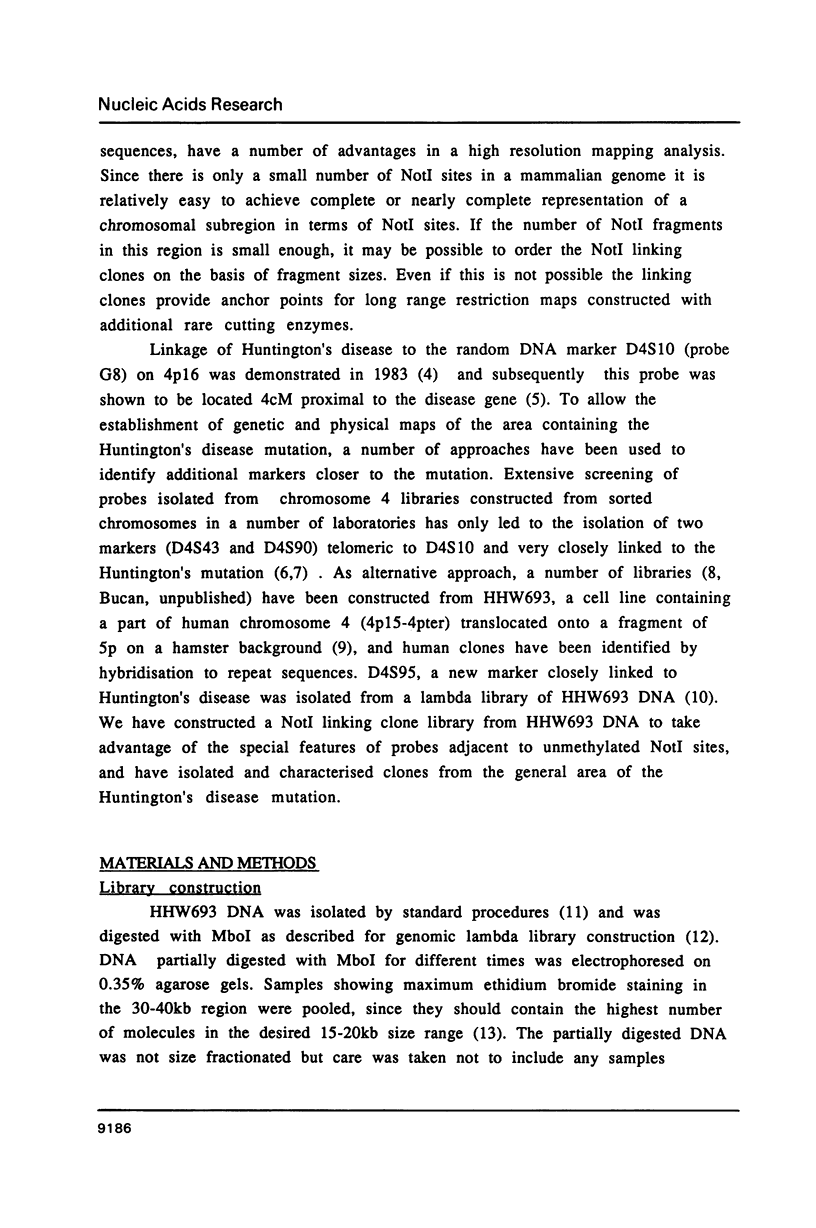
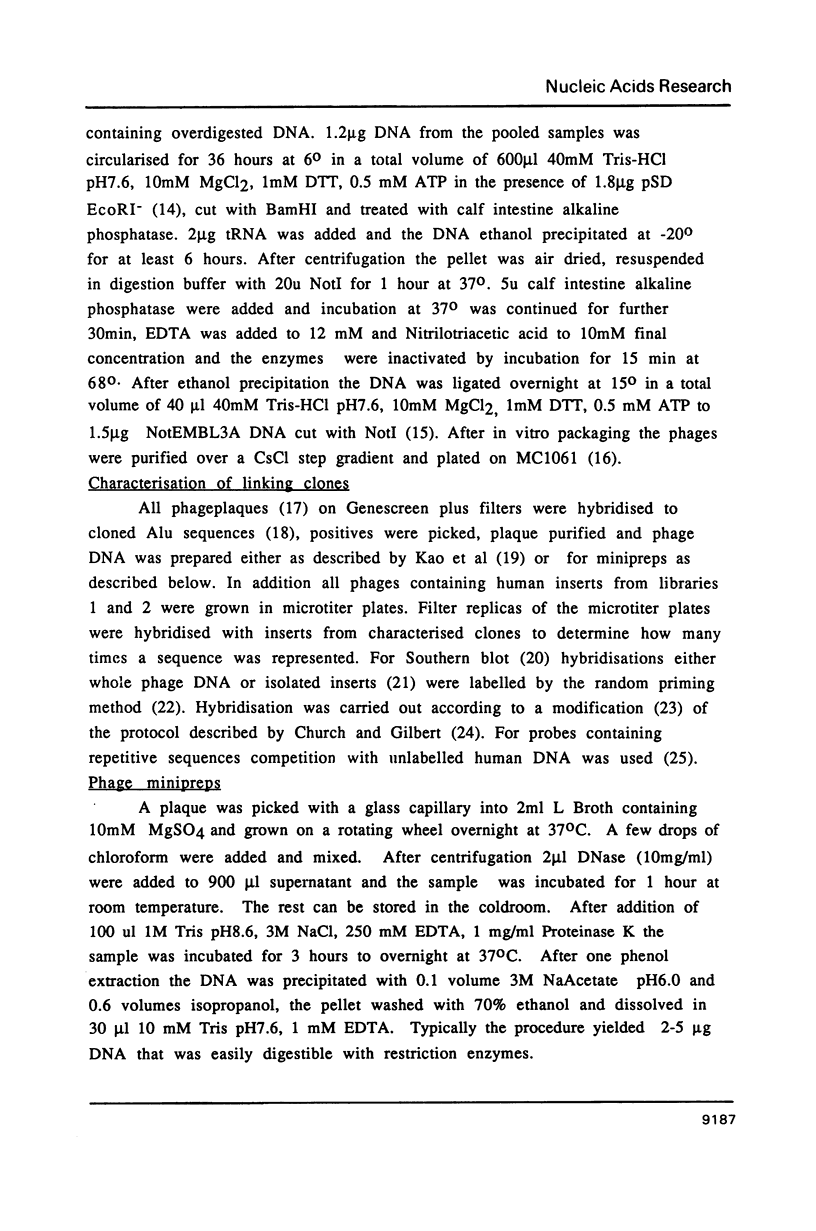
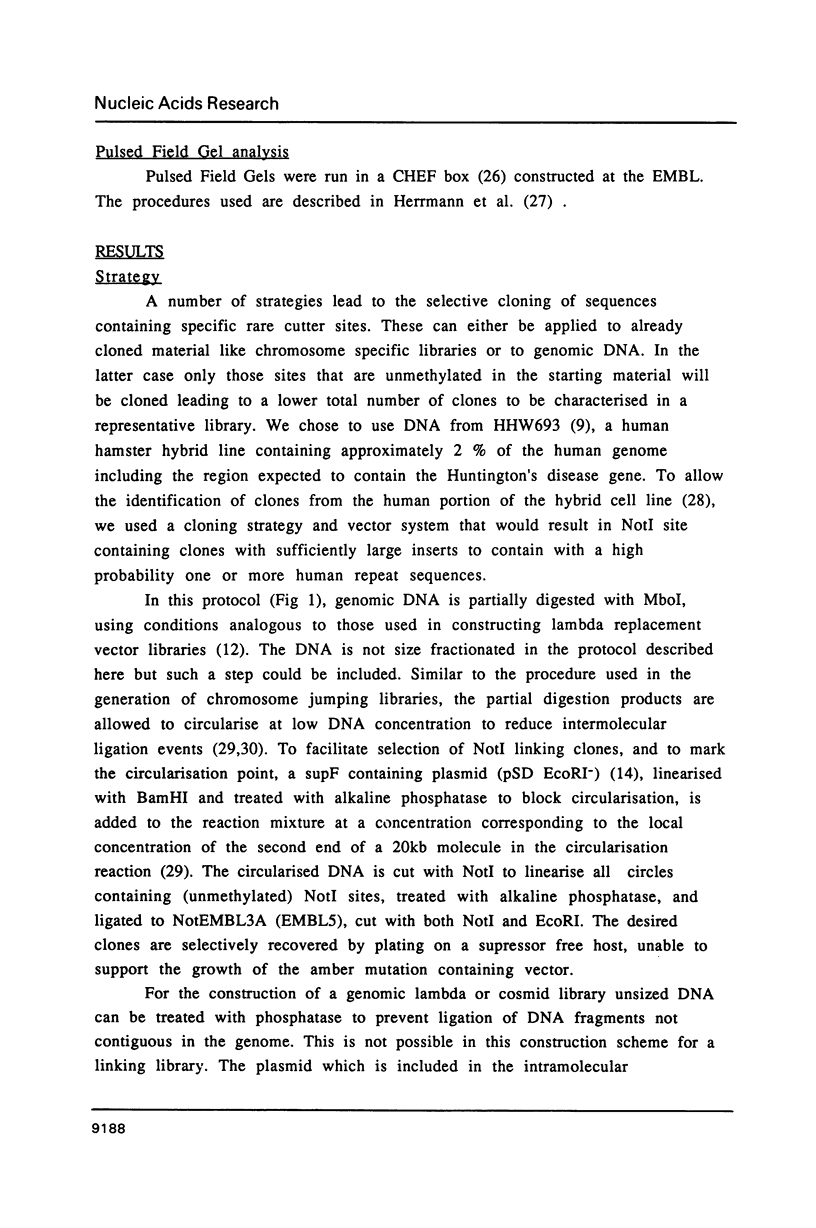
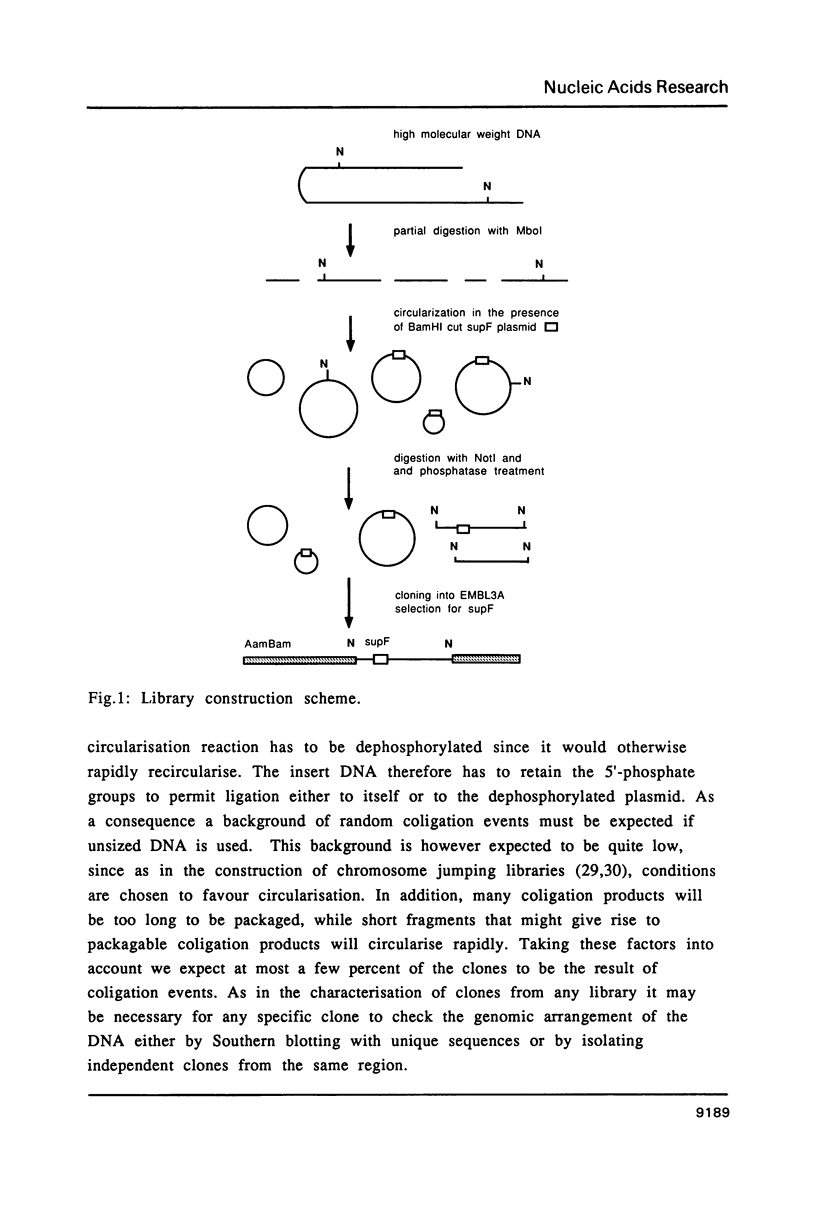

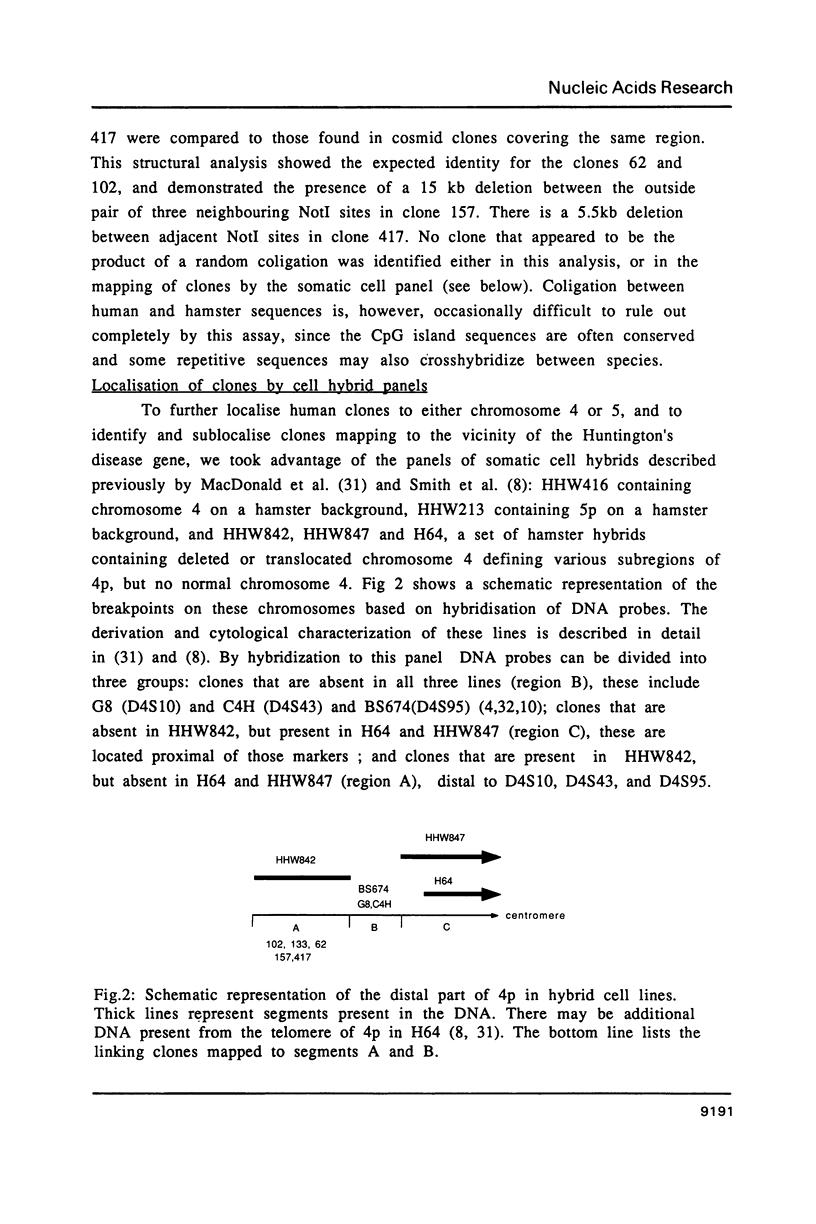
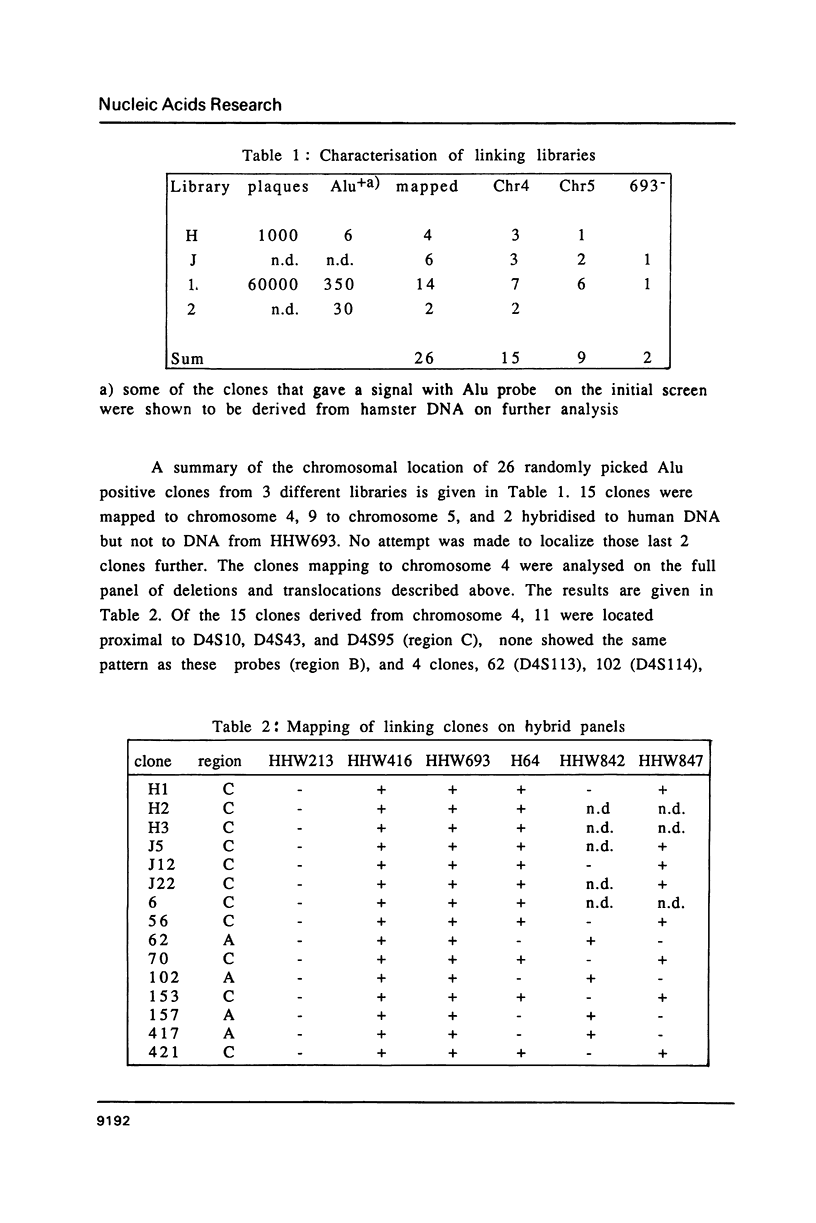

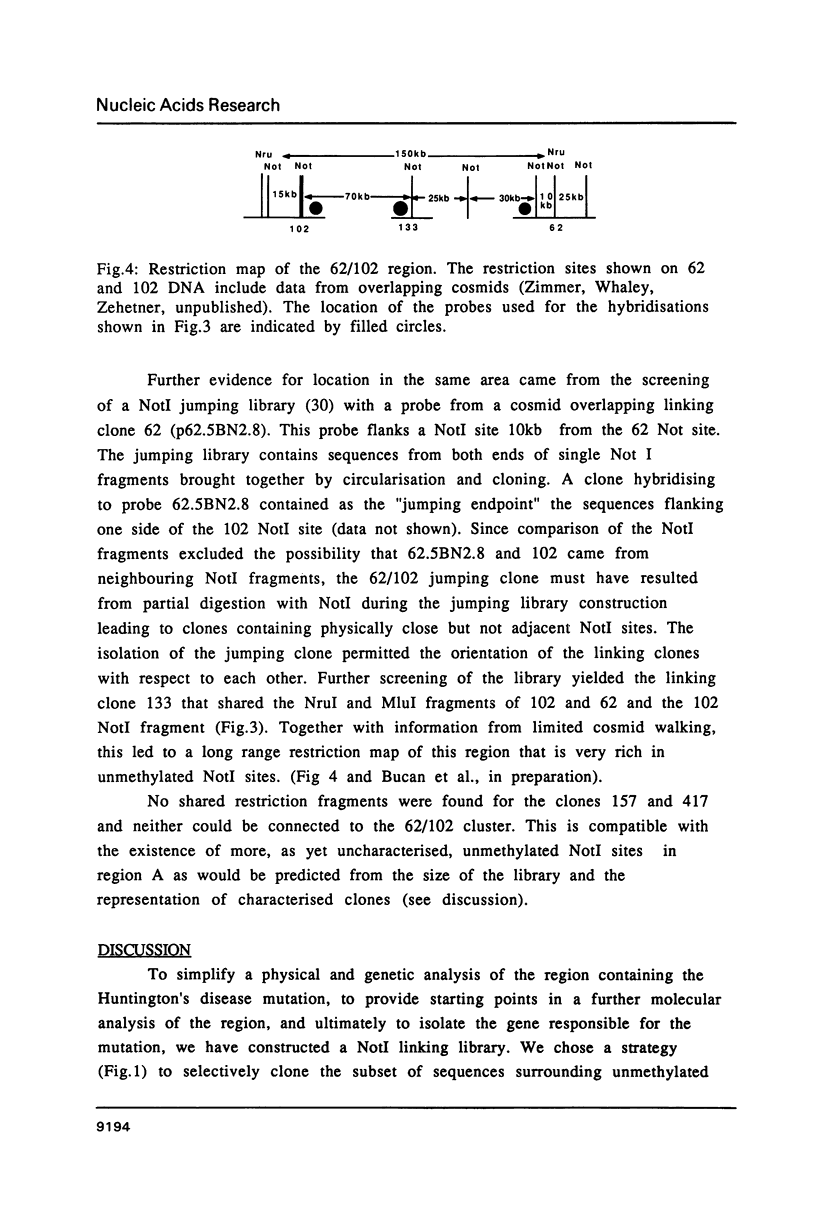
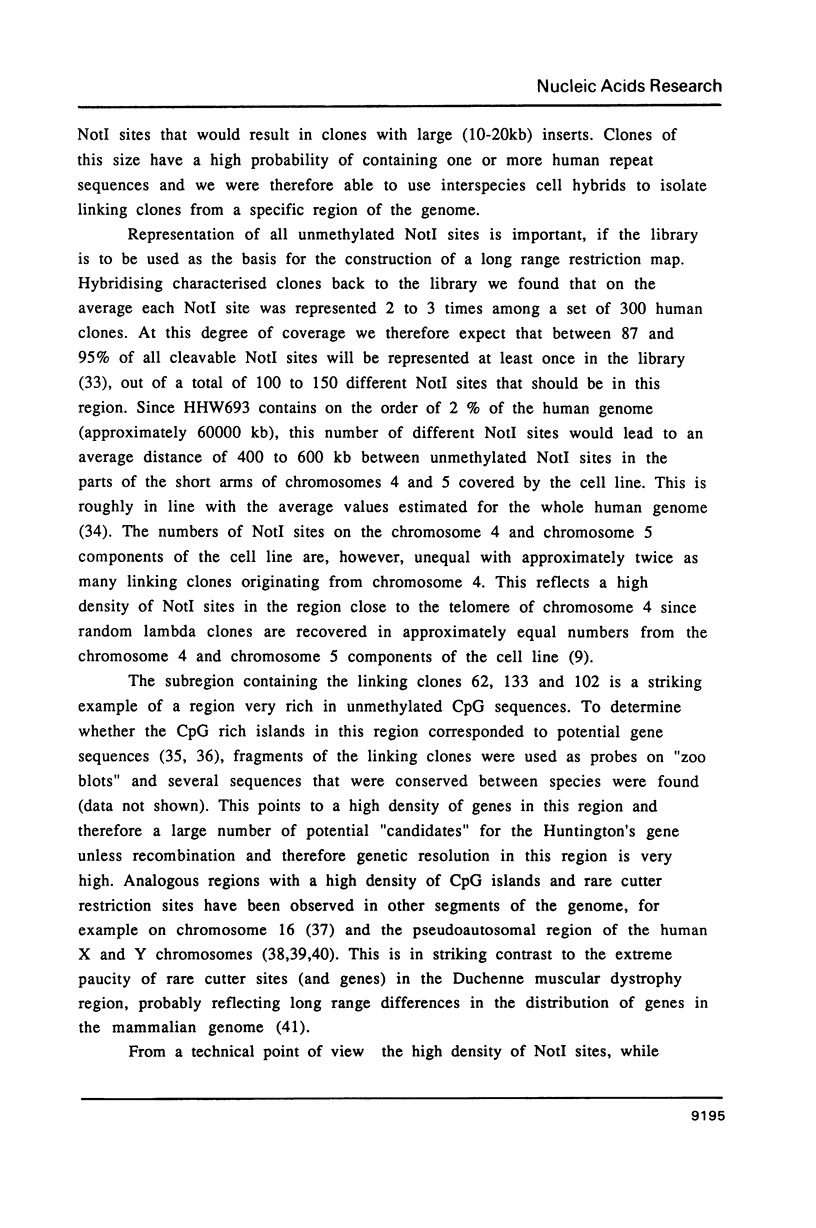
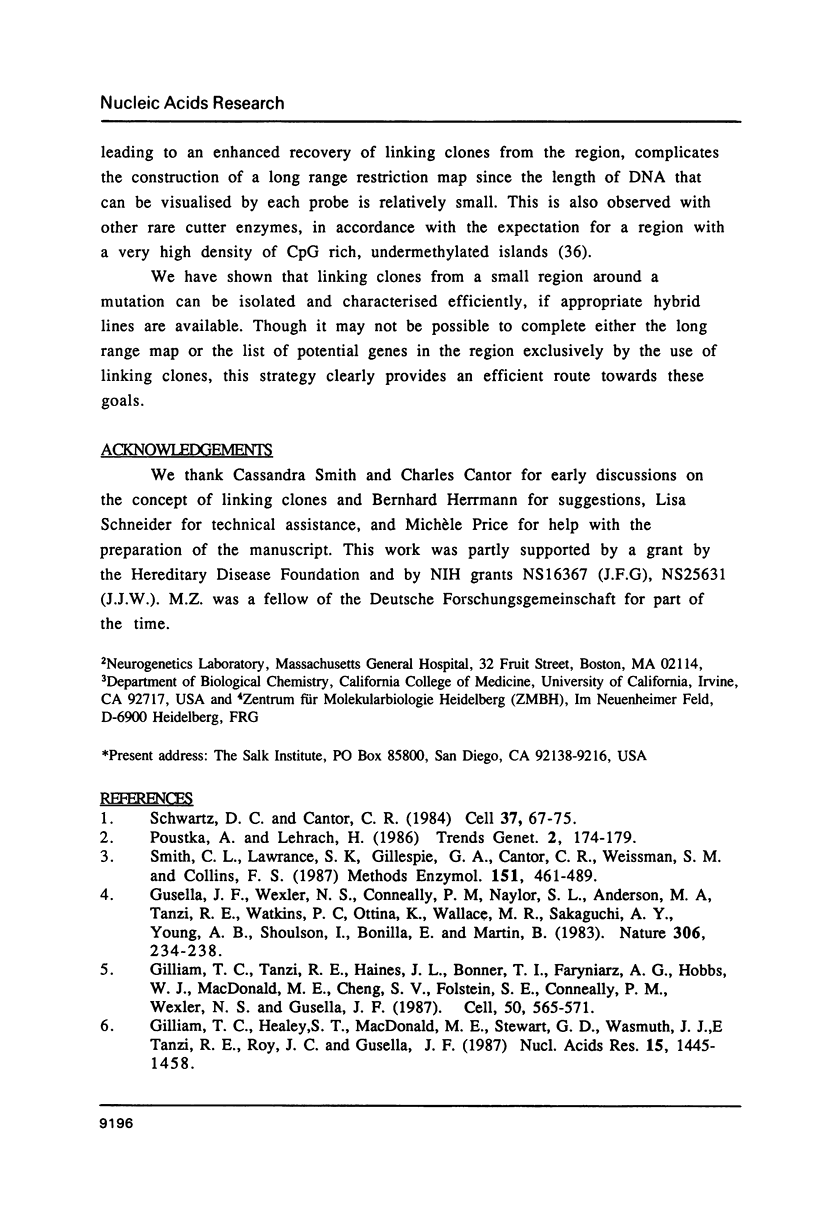
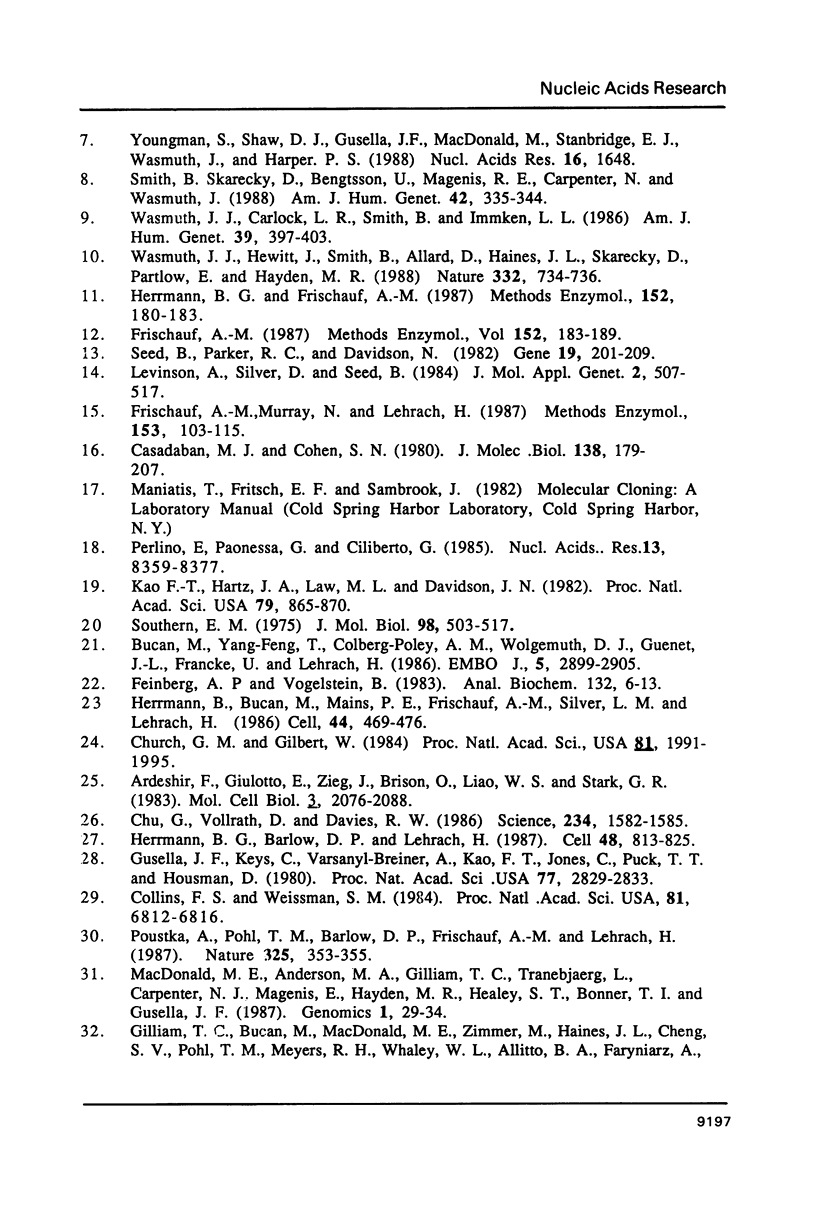
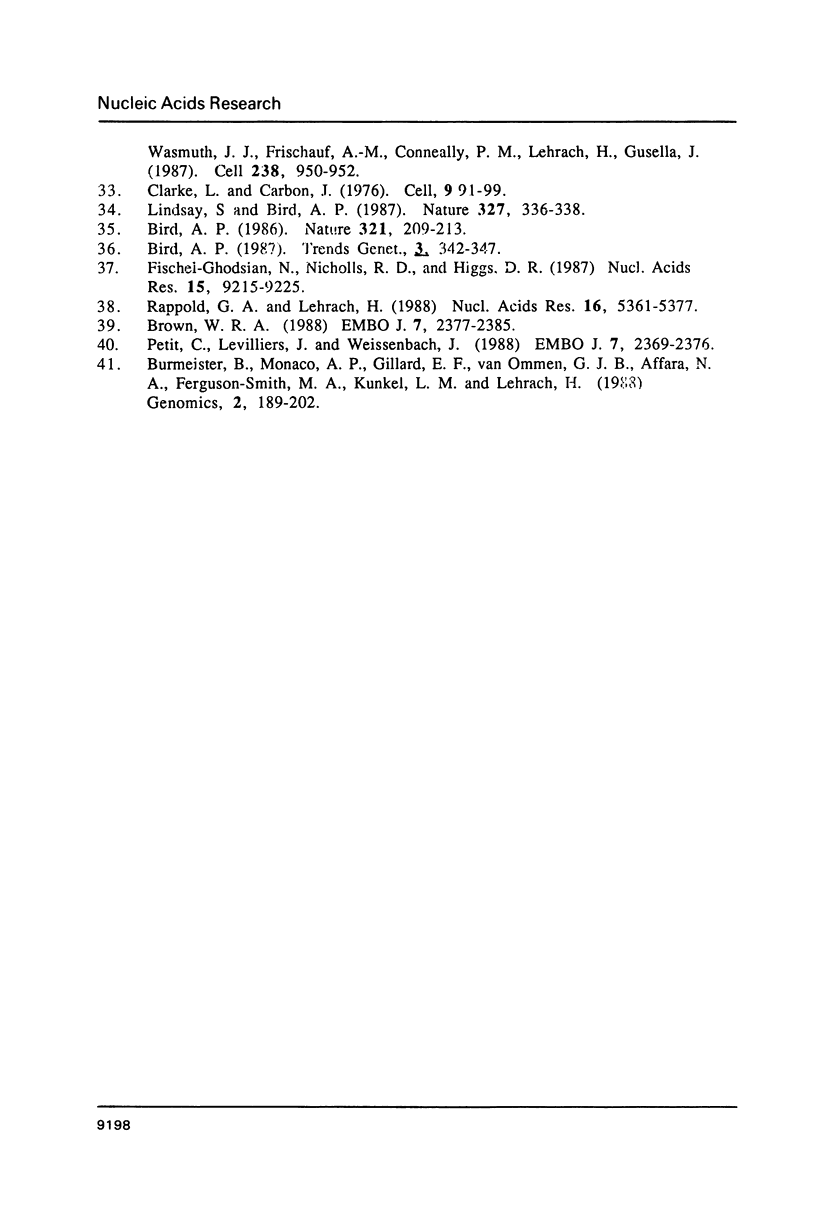
Images in this article
Selected References
These references are in PubMed. This may not be the complete list of references from this article.
- Ardeshir F., Giulotto E., Zieg J., Brison O., Liao W. S., Stark G. R. Structure of amplified DNA in different Syrian hamster cell lines resistant to N-(phosphonacetyl)-L-aspartate. Mol Cell Biol. 1983 Nov;3(11):2076–2088. doi: 10.1128/mcb.3.11.2076. [DOI] [PMC free article] [PubMed] [Google Scholar]
- Bird A. P. CpG-rich islands and the function of DNA methylation. Nature. 1986 May 15;321(6067):209–213. doi: 10.1038/321209a0. [DOI] [PubMed] [Google Scholar]
- Brown W. R. A physical map of the human pseudoautosomal region. EMBO J. 1988 Aug;7(8):2377–2385. doi: 10.1002/j.1460-2075.1988.tb03082.x. [DOI] [PMC free article] [PubMed] [Google Scholar]
- Bućan M., Yang-Feng T., Colberg-Poley A. M., Wolgemuth D. J., Guenet J. L., Francke U., Lehrach H. Genetic and cytogenetic localisation of the homeo box containing genes on mouse chromosome 6 and human chromosome 7. EMBO J. 1986 Nov;5(11):2899–2905. doi: 10.1002/j.1460-2075.1986.tb04585.x. [DOI] [PMC free article] [PubMed] [Google Scholar]
- Casadaban M. J., Cohen S. N. Analysis of gene control signals by DNA fusion and cloning in Escherichia coli. J Mol Biol. 1980 Apr;138(2):179–207. doi: 10.1016/0022-2836(80)90283-1. [DOI] [PubMed] [Google Scholar]
- Chu G., Vollrath D., Davis R. W. Separation of large DNA molecules by contour-clamped homogeneous electric fields. Science. 1986 Dec 19;234(4783):1582–1585. doi: 10.1126/science.3538420. [DOI] [PubMed] [Google Scholar]
- Church G. M., Gilbert W. Genomic sequencing. Proc Natl Acad Sci U S A. 1984 Apr;81(7):1991–1995. doi: 10.1073/pnas.81.7.1991. [DOI] [PMC free article] [PubMed] [Google Scholar]
- Clarke L., Carbon J. A colony bank containing synthetic Col El hybrid plasmids representative of the entire E. coli genome. Cell. 1976 Sep;9(1):91–99. doi: 10.1016/0092-8674(76)90055-6. [DOI] [PubMed] [Google Scholar]
- Feinberg A. P., Vogelstein B. A technique for radiolabeling DNA restriction endonuclease fragments to high specific activity. Anal Biochem. 1983 Jul 1;132(1):6–13. doi: 10.1016/0003-2697(83)90418-9. [DOI] [PubMed] [Google Scholar]
- Fischel-Ghodsian N., Nicholls R. D., Higgs D. R. Unusual features of CpG-rich (HTF) islands in the human alpha globin complex: association with non-functional pseudogenes and presence within the 3' portion of the zeta gene. Nucleic Acids Res. 1987 Nov 25;15(22):9215–9225. doi: 10.1093/nar/15.22.9215. [DOI] [PMC free article] [PubMed] [Google Scholar]
- Frischauf A. M. Digestion of DNA: size fractionation. Methods Enzymol. 1987;152:183–189. doi: 10.1016/0076-6879(87)52019-5. [DOI] [PubMed] [Google Scholar]
- Frischauf A. M., Murray N., Lehrach H. Lambda phage vectors--EMBL series. Methods Enzymol. 1987;153:103–115. doi: 10.1016/0076-6879(87)53051-8. [DOI] [PubMed] [Google Scholar]
- Gilliam T. C., Healey S. T., MacDonald M. E., Stewart G. D., Wasmuth J. J., Tanzi R. E., Roy J. C., Gusella J. F. Isolation of polymorphic DNA fragments from human chromosome 4. Nucleic Acids Res. 1987 Feb 25;15(4):1445–1458. doi: 10.1093/nar/15.4.1445. [DOI] [PMC free article] [PubMed] [Google Scholar]
- Gilliam T. C., Tanzi R. E., Haines J. L., Bonner T. I., Faryniarz A. G., Hobbs W. J., MacDonald M. E., Cheng S. V., Folstein S. E., Conneally P. M. Localization of the Huntington's disease gene to a small segment of chromosome 4 flanked by D4S10 and the telomere. Cell. 1987 Aug 14;50(4):565–571. doi: 10.1016/0092-8674(87)90029-8. [DOI] [PubMed] [Google Scholar]
- Gusella J. F., Keys C., VarsanyiBreiner A., Kao F. T., Jones C., Puck T. T., Housman D. Isolation and localization of DNA segments from specific human chromosomes. Proc Natl Acad Sci U S A. 1980 May;77(5):2829–2833. doi: 10.1073/pnas.77.5.2829. [DOI] [PMC free article] [PubMed] [Google Scholar]
- Gusella J. F., Wexler N. S., Conneally P. M., Naylor S. L., Anderson M. A., Tanzi R. E., Watkins P. C., Ottina K., Wallace M. R., Sakaguchi A. Y. A polymorphic DNA marker genetically linked to Huntington's disease. Nature. 1983 Nov 17;306(5940):234–238. doi: 10.1038/306234a0. [DOI] [PubMed] [Google Scholar]
- Herrmann B. G., Barlow D. P., Lehrach H. A large inverted duplication allows homologous recombination between chromosomes heterozygous for the proximal t complex inversion. Cell. 1987 Mar 13;48(5):813–825. doi: 10.1016/0092-8674(87)90078-x. [DOI] [PubMed] [Google Scholar]
- Herrmann B. G., Frischauf A. M. Isolation of genomic DNA. Methods Enzymol. 1987;152:180–183. doi: 10.1016/0076-6879(87)52018-3. [DOI] [PubMed] [Google Scholar]
- Herrmann B., Bućan M., Mains P. E., Frischauf A. M., Silver L. M., Lehrach H. Genetic analysis of the proximal portion of the mouse t complex: evidence for a second inversion within t haplotypes. Cell. 1986 Feb 14;44(3):469–476. doi: 10.1016/0092-8674(86)90468-x. [DOI] [PubMed] [Google Scholar]
- Kao F. T., Hartz J. A., Law M. L., Davidson J. N. Isolation and chromosomal localization of unique DNA sequences from a human genomic library. Proc Natl Acad Sci U S A. 1982 Feb;79(3):865–869. doi: 10.1073/pnas.79.3.865. [DOI] [PMC free article] [PubMed] [Google Scholar]
- Levinson A., Silver D., Seed B. Minimal size plasmids containing an M13 origin for production of single-strand transducing particles. J Mol Appl Genet. 1984;2(6):507–517. [PubMed] [Google Scholar]
- Lindsay S., Bird A. P. Use of restriction enzymes to detect potential gene sequences in mammalian DNA. 1987 May 28-Jun 3Nature. 327(6120):336–338. doi: 10.1038/327336a0. [DOI] [PubMed] [Google Scholar]
- MacDonald M. E., Anderson M. A., Gilliam T. C., Tranejaerg L., Carpenter N. J., Magenis E., Hayden M. R., Healey S. T., Bonner T. I., Gusella J. F. A somatic cell hybrid panel for localizing DNA segments near the Huntington's disease gene. Genomics. 1987 Sep;1(1):29–34. doi: 10.1016/0888-7543(87)90101-7. [DOI] [PubMed] [Google Scholar]
- Perlino E., Paonessa G., Ciliberto G. Alu sequences transcription in X. laevis oocytes: nuclear-cytoplasmic partitioning and evidence for 3' end processing reactions. Nucleic Acids Res. 1985 Dec 9;13(23):8359–8377. doi: 10.1093/nar/13.23.8359. [DOI] [PMC free article] [PubMed] [Google Scholar]
- Petit C., Levilliers J., Weissenbach J. Physical mapping of the human pseudo-autosomal region; comparison with genetic linkage map. EMBO J. 1988 Aug;7(8):2369–2376. doi: 10.1002/j.1460-2075.1988.tb03081.x. [DOI] [PMC free article] [PubMed] [Google Scholar]
- Poustka A., Pohl T. M., Barlow D. P., Frischauf A. M., Lehrach H. Construction and use of human chromosome jumping libraries from NotI-digested DNA. Nature. 1987 Jan 22;325(6102):353–355. doi: 10.1038/325353a0. [DOI] [PubMed] [Google Scholar]
- Rappold G. A., Lehrach H. A long range restriction map of the pseudoautosomal region by partial digest PFGE analysis from the telomere. Nucleic Acids Res. 1988 Jun 24;16(12):5361–5377. doi: 10.1093/nar/16.12.5361. [DOI] [PMC free article] [PubMed] [Google Scholar]
- Schwartz D. C., Cantor C. R. Separation of yeast chromosome-sized DNAs by pulsed field gradient gel electrophoresis. Cell. 1984 May;37(1):67–75. doi: 10.1016/0092-8674(84)90301-5. [DOI] [PubMed] [Google Scholar]
- Seed B., Parker R. C., Davidson N. Representation of DNA sequences in recombinant DNA libraries prepared by restriction enzyme partial digestion. Gene. 1982 Sep;19(2):201–209. doi: 10.1016/0378-1119(82)90007-5. [DOI] [PubMed] [Google Scholar]
- Smith B., Skarecky D., Bengtsson U., Magenis R. E., Carpenter N., Wasmuth J. J. Isolation of DNA markers in the direction of the Huntington disease gene from the G8 locus. Am J Hum Genet. 1988 Feb;42(2):335–344. [PMC free article] [PubMed] [Google Scholar]
- Smith C. L., Lawrance S. K., Gillespie G. A., Cantor C. R., Weissman S. M., Collins F. S. Strategies for mapping and cloning macroregions of mammalian genomes. Methods Enzymol. 1987;151:461–489. doi: 10.1016/s0076-6879(87)51038-2. [DOI] [PubMed] [Google Scholar]
- Southern E. M. Detection of specific sequences among DNA fragments separated by gel electrophoresis. J Mol Biol. 1975 Nov 5;98(3):503–517. doi: 10.1016/s0022-2836(75)80083-0. [DOI] [PubMed] [Google Scholar]
- Wasmuth J. J., Carlock L. R., Smith B., Immken L. L. A cell hybrid and recombinant DNA library that facilitate identification of polymorphic loci in the vicinity of the Huntington disease gene. Am J Hum Genet. 1986 Sep;39(3):397–403. [PMC free article] [PubMed] [Google Scholar]
- Wasmuth J. J., Hewitt J., Smith B., Allard D., Haines J. L., Skarecky D., Partlow E., Hayden M. R. A highly polymorphic locus very tightly linked to the Huntington's disease gene. Nature. 1988 Apr 21;332(6166):734–736. doi: 10.1038/332734a0. [DOI] [PubMed] [Google Scholar]
- Youngman S., Shaw D. J., Gusella J. F., MacDonald M., Stanbridge E. J., Wasmuth J., Harper P. S. A DNA probe, D5 [D4S90] mapping to human chromosome 4p16.3. Nucleic Acids Res. 1988 Feb 25;16(4):1648–1648. doi: 10.1093/nar/16.4.1648. [DOI] [PMC free article] [PubMed] [Google Scholar]




